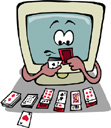
Solitaire addiction is fast becoming a real concern for thousands of people. Think about it — everyone you know has a computer either at home or at their job, some people have both. What does every computer have? Some form of solitaire. And when do people play solitaire? When they’re looking to kill time or to “relax”. Sounds a lot like the reasons I drink alcohol, and where there’s addictive behavior, there’s always addiction.
To help determine if someone is addicted to solitaire, here are a few easy questions. Are you spending more than fifteen minutes a day playing solitaire? Do your friends and loved ones complain about how much time you spend on the computer playing solitaire? Has solitaire ever kept you up so late that you missed work? Do you feel guilty or embarrassed by how much of your time is spent playing solitaire?
Solitaire is readily available, free, and requires nothing to work outside of your computer (or just a plain deck of cards). But because solitaire is most often played on a computer, people who are susceptible to computer, Internet, or gaming addiction are also susceptible to solitaire addiction. The “experts” tell us that many of the symptoms of solitaire addiction are held in common with those other kinds of electronic habits. Here’s a shortlist of solitaire addiction signs you can use to make sure you or someone you love isn’t becoming a solitaire addict:
- Getting an excited or “rushing” feeling when playing Solitaire
- Feeling guilty about playing Solitaire but continuing to play
- Not being in control of the amount of time spent on playing solitaire
- Lying about the amount of time you spend playing solitaire, thinking about solitaire, or even dreaming about the game
- Playing solitaire to deal with feelings of sadness or anxiety.
- Becoming angry when your “real life” interrupts your solitaire time
There are also a handful of physical signs that solitaire addiction could be present. These include the onset of carpal tunnel syndrome, dry bleary eyes from staring at the computer screen, recurring headaches and back pain, trouble eating, and ignoring personal hygiene.
What can you do for a person who you believe has solitaire addiction? Many people with these kinds of addictions require cognitive behavioral therapy (CBT) in order to overcome their addiciton. Cognitive behavioral therapy teaches addicts to identify a problem in their life and then find the tools to solve it. CBT is becoming increasingly popular for a wide range of addictions, not just gaming or Internet addiction. Harvard Medical School’s McLean Hospital has one of the first computer gaming addiction treatment centers in the world, and offers serious help for people seriously impacted by solitaire or other gaming addiction.
Experts in addiction and computer addiction also suggest attending support groups where they can talk about their problems with their peers. In these groups, addicts learn coping skills to prevent gaming relapses — but it is important to recognize a solitaire addict’s needs to stay off the computer, so no online addiction help, and addicts should stay away from computers as often as is possible.
This blog post probably sums up most people’s attitudes about solitaire addiction (let’s just say the author doesn’t take the idea of gaming or Internet addiction very seriously) but any kind of addiction is a serious problem and should be treated as such. The first step to treating your own solitaire addiction (or to helping someone else treat theirs) is to acknowledge that you have a problem and that you need to change. Otherwise, you’ll slide back into a position where you’re playing solitaire to ease pain or deal with stress. Relapse is very easy with solitaire and other gaming addictions because these games are everywhere, free, and seemingly harmless. Because of these factors, solitaire addiction is particularly nasty and hard to treat.
Here’s a handy quiz to help you determine if you are in fact addicted to solitaire. I have heard stories of people playing solitaire games up to eight or ten hours a day — any activity that is not work-related that takes up that much of your day deserves a nice long look to determine if maybe there’s an addiction forming.
If you have questions about a potential gaming addiction of any kind, visit Online Gaming Anonymous. These guys offer support, resources, and a community of people looking to conquer their addiction just like you are. Remember — there’s help out there. You just have to accept it. OLGANON works like other addiction support groups, with twelve steps and traditions (like AA or NA) and a sponsor system to help people get over their problems with gaming addiction.
More Solitaire Articles: